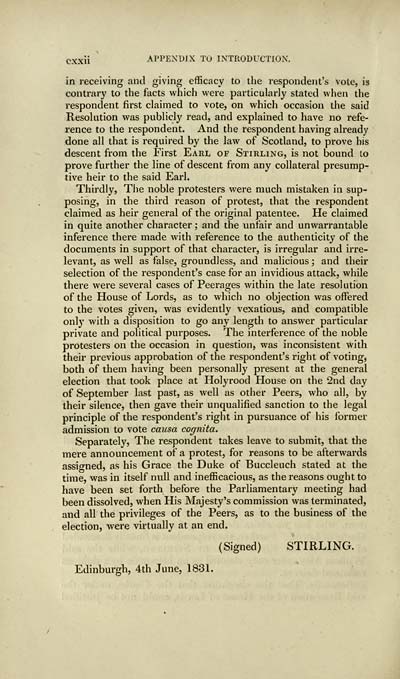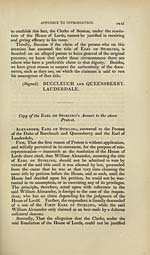Stirling peerage
(180) Page cxxii
Download files
Complete book:
Individual page:
Thumbnail gallery: Grid view | List view

exxii APPENDIX TU INTRODUCTION.
in receiving and giving efficacy to tlie respondent's vote, is
contrary to the facts which were particularly stated when the
respondent first claimed to vote, on which occasion the said
Resolution was publicly read, and explained to have no refe-
rence to the respondent. And the respondent having already
done all that is required by the law of Scotland, to prove his
descent from the First Earl of Stirling, is not bound to
prove further the line of descent from any collateral presump-
tive heir to the said Earl.
Thirdly, The noble protesters were much mistaken in sup-
posing, in the third reason of protest, that the respondent
claimed as heir general of the original patentee. He claimed
in quite another character ; and the unfair and unwarrantable
inference there made with reference to the authenticity of the
documents in support of that character, is irregular and irre-
levant, as well as false, groundless, and malicious ; and their
selection of the respondent's case for an invidious attack, while
there were several cases of Peerages within the late resolution
of the House of Lords, as to which no objection was offered
to the votes given, was evidently vexatious, and compatible
only with a disposition to go any length to answer particular
private and political purposes. The interference of the noble
protesters on the occasion in question, was inconsistent with
their previous approbation of the respondent's right of voting,
both of them having been personally present at the general
election that took place at Holyrood House on the 2nd day
of September hist past, as well as other Peers, who all, by
their silence, then gave their unqualified sanction to the legal
principle of the respondent's right in pursuance of his former
admission to vote causa cognita.
Separately, The respondent takes leave to submit, that the
mei'e announcement of a protest, for reasons to be afterwards
assigned, as his Grace the Duke of Buccleuch stated at the
time, was in itself null and inefficacious, as the reasons ought to
have been set forth before the Parliamentary meeting had
been dissolved, when His Majesty's commission was terminated,
and all the privileges of the Peers, as to the business of the
election, were virtually at an end.
(Signed) STIRLING.
Edinburgh, 4th June, 1831.
in receiving and giving efficacy to tlie respondent's vote, is
contrary to the facts which were particularly stated when the
respondent first claimed to vote, on which occasion the said
Resolution was publicly read, and explained to have no refe-
rence to the respondent. And the respondent having already
done all that is required by the law of Scotland, to prove his
descent from the First Earl of Stirling, is not bound to
prove further the line of descent from any collateral presump-
tive heir to the said Earl.
Thirdly, The noble protesters were much mistaken in sup-
posing, in the third reason of protest, that the respondent
claimed as heir general of the original patentee. He claimed
in quite another character ; and the unfair and unwarrantable
inference there made with reference to the authenticity of the
documents in support of that character, is irregular and irre-
levant, as well as false, groundless, and malicious ; and their
selection of the respondent's case for an invidious attack, while
there were several cases of Peerages within the late resolution
of the House of Lords, as to which no objection was offered
to the votes given, was evidently vexatious, and compatible
only with a disposition to go any length to answer particular
private and political purposes. The interference of the noble
protesters on the occasion in question, was inconsistent with
their previous approbation of the respondent's right of voting,
both of them having been personally present at the general
election that took place at Holyrood House on the 2nd day
of September hist past, as well as other Peers, who all, by
their silence, then gave their unqualified sanction to the legal
principle of the respondent's right in pursuance of his former
admission to vote causa cognita.
Separately, The respondent takes leave to submit, that the
mei'e announcement of a protest, for reasons to be afterwards
assigned, as his Grace the Duke of Buccleuch stated at the
time, was in itself null and inefficacious, as the reasons ought to
have been set forth before the Parliamentary meeting had
been dissolved, when His Majesty's commission was terminated,
and all the privileges of the Peers, as to the business of the
election, were virtually at an end.
(Signed) STIRLING.
Edinburgh, 4th June, 1831.
Set display mode to:
![]() Universal Viewer |
Universal Viewer | ![]() Mirador |
Large image | Transcription
Mirador |
Large image | Transcription
Images and transcriptions on this page, including medium image downloads, may be used under the Creative Commons Attribution 4.0 International Licence unless otherwise stated. ![]()
| Histories of Scottish families > Stirling peerage > (180) Page cxxii |
|---|
| Permanent URL | https://digital.nls.uk/95008010 |
|---|
| Description | A selection of almost 400 printed items relating to the history of Scottish families, mostly dating from the 19th and early 20th centuries. Includes memoirs, genealogies and clan histories, with a few produced by emigrant families. The earliest family history goes back to AD 916. |
|---|

![[Page 1]Trial of Alexander Humphrys, or Alexander, styling himself Earl of Stirling](https://deriv.nls.uk/dcn4/9500/95008024.4.jpg)